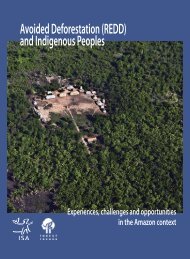BASELINE STUDY 5, Thailand - Forest Trends
BASELINE STUDY 5, Thailand - Forest Trends
BASELINE STUDY 5, Thailand - Forest Trends
Create successful ePaper yourself
Turn your PDF publications into a flip-book with our unique Google optimized e-Paper software.
ject began in 2001, no certifications have been awarded to companies; interest and momentum behind the TISI<br />
scheme appears to have stalled.<br />
Non-FIO plantations: The RFD administers number 13 and 15 Sor Por documents (the former for cutting plantation<br />
trees, the latter for listing cut logs from plantations) for plantation teak and Dipterocarp wood. This entails<br />
registering the tree plantation with the RFD, with the owners themselves recording data, and informing<br />
the district RFD official when trees are cut. The system appears to have difficulty when natural teak and<br />
Dipterocarp species are mixed with plantation counterparts; while there appear to be many cases of such mixing,<br />
the volumes are relatively small.<br />
Smallholder plantations: The Number 13 and 15 Sor Por documents, however, are not a specific COC or certification<br />
system for farmers’ tree plantations. This is largely due to the fact that farmers’ plantation trees are destined<br />
for the domestic market, not for the international market. There are no sustainable forest management<br />
(SFM) plans yet for smallholder plantations, although <strong>Thailand</strong> is currently ready to begin pilot projects under<br />
the ITTO’s Criteria and Indicators (C&I) program. RFD officials appear interested in certification schemes for<br />
smallholder plantations, but express doubts about the cost effectiveness for small plantations.<br />
In addition to the documentation systems listed above, the RFD has been developing a new paperless timber<br />
tracking system, in-line with ASEAN requirements and the Pan-ASEAN Timber Certification Initiative (see section<br />
7.2.3 below).<br />
7.2 External Certification Schemes<br />
In late 2010, wood companies with good connections to the export market began to become more aware of<br />
their exposure to FLEGT Voluntary Partnership Agreements (VPAs), the US Lacey Act and the EU Timber Regulation.<br />
Many of the companies interviewed for this report in July 2010 asserted that due diligence systems have<br />
already been built into the Thai system for legal wood, so they do not believe that compliance will be a significant<br />
issue. A few large Thai furniture companies confided that they believe their good government connections<br />
will also ease any potential hurdles with due diligence issues. But others have become concerned about their<br />
exports to the EU and the United States and are playing a strong role in encouraging active industry and government<br />
to better understand the potential risks to exports and respond accordingly. Many believe that systems<br />
such as FSC will be economically unfeasible, and that the first FSC private teak plantation in <strong>Thailand</strong> was<br />
only possible due to RFD support. A few companies have already diversified their wood procurement portfolio<br />
away from an earlier focus on Myanmar teak products, or are focusing on new technologies to heat-treat<br />
hardwoods to have characteristics more similar to teak.<br />
7.2.1 FSC Certification<br />
The state-owned FIO secured FSC plantation management certificates for two sites in 2001 (Thong Pha Phum in<br />
Kanchanaburi province and Khao Kra Yang in Phitsanlouk province) but both were suspended in late 2003 by<br />
the independent auditor, Smartwood, due to the failure of the FIO to respond to a number of Corrective Action<br />
Requests. 23 FSC accreditation has not been re-issued to these forest management units since that time. In 2008,<br />
the FIO gained FSC certification for four other teak producing forest management units (Thung Kwian, Mae<br />
Mye, Wang Chin, and Khun Mae Kammee teak plantations, located in Lampang and Phrae provinces), totalling<br />
23 The Smartwood CAR’s related primarily to requirements to improve the COC system for tracking certified logs, and a requirement<br />
to meet the Thai minimum wage standards for FIO employees. In a detailed study the World Rainforest Movement<br />
(2003) also identified numerous other problems with the certification process in <strong>Thailand</strong>. WRM stated in a press<br />
release that “…the [Thai FSC plantation certification] process is characterized by inadequate information, participation,<br />
consultation, transparency and basic social, political, cultural, economic and environmental research.”<br />
© EU FLEGT Facility, <strong>BASELINE</strong> <strong>STUDY</strong> 5, <strong>Thailand</strong>: Overview of <strong>Forest</strong> Law Enforcement, Governance and Trade, July 2011<br />
This Action is funded by the European Union and the governments of Finland, France, Germany, the Netherlands, Spain and the UK. The views expressed herein<br />
can in no way be taken to reflect the official opinion of the European Union.<br />
www.euflegt.efi.int<br />
44
















